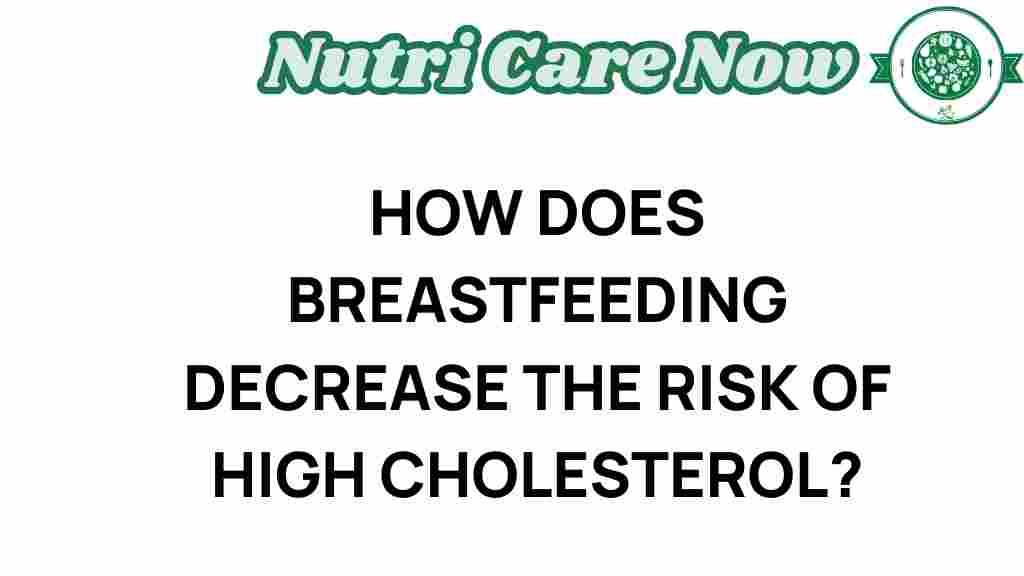Unveiling the Connection: How Breastfeeding Reduces Cholesterol Risks
Breastfeeding is often celebrated for its numerous health benefits, both for infants and mothers. While many are aware of its role in providing essential nutrients to newborns, fewer people recognize how breastfeeding can influence cholesterol levels and reduce cardiovascular risk later in life. In this article, we will explore the intricate connection between breastfeeding, cholesterol, and overall health, shedding light on the importance of infant nutrition and maternal health in early development.
The Role of Breastfeeding in Infant Nutrition
Breastfeeding is the natural way to feed infants, providing them with all the necessary nutrients for healthy growth and development. The composition of breast milk is uniquely suited to meet the needs of a growing baby, containing:
- Proteins that aid in growth
- Fats that are essential for brain development
- Vitamins and minerals that support immune function
- Antibodies that help protect against infections
Beyond these nutrients, studies have shown that breastfeeding can have long-term effects on cholesterol levels and heart health. Breast milk is lower in cholesterol compared to formula milk, which may help infants establish healthier cholesterol levels as they grow.
The Impact of Breastfeeding on Maternal Health
Breastfeeding also plays a crucial role in maternal health. It helps mothers recover from childbirth and can reduce the risk of several health problems, including:
- Postpartum depression
- Ovarian cancer
- Breast cancer
- Cardiovascular diseases
When mothers breastfeed, they experience hormonal changes that can help lower their cholesterol levels. This is an essential factor in reducing cardiovascular risk, making breastfeeding beneficial not only for infants but also for mothers.
The Link Between Breastfeeding and Cholesterol Levels
Research indicates that children who were breastfed tend to have lower cholesterol levels in their later years. Here’s how breastfeeding influences cholesterol:
- Composition of Breast Milk: Breast milk contains essential fatty acids that can help regulate cholesterol levels in infants.
- Reduced Saturated Fats: Breastfeeding exposes infants to healthier fats, which can lead to better cholesterol profiles as they age.
- Establishment of Healthy Eating Patterns: Early exposure to the flavors in breast milk can influence dietary preferences later in life, promoting healthier eating habits.
These factors combined suggest that breastfeeding may play a significant role in mitigating the risk of high cholesterol and related cardiovascular diseases.
Understanding Cardiovascular Risk in Early Development
The early development stage is critical for establishing lifelong health habits. Breastfeeding sets the foundation for:
- Healthy weight management
- Improved metabolic function
- Lower risk of obesity
By reducing the likelihood of obesity and fostering a healthy metabolic system, breastfeeding can significantly decrease the risk of developing high cholesterol and cardiovascular diseases later in life.
Public Health Implications of Breastfeeding
Promoting breastfeeding is not just a personal choice; it’s a public health priority. The health benefits of breastfeeding extend beyond the individual, impacting community health as well. Some of the public health implications include:
- Lower Healthcare Costs: Fewer health issues related to obesity and high cholesterol can lead to reduced healthcare expenditures.
- Improved Population Health: Higher rates of breastfeeding can lead to healthier populations with lower incidences of chronic diseases.
- Informed Health Policies: Understanding the benefits of breastfeeding can inform policies that support nursing mothers and promote breastfeeding initiatives.
Organizations like the World Health Organization (WHO) advocate for exclusive breastfeeding for the first six months of life due to its extensive health benefits. For more information on breastfeeding guidelines, you can visit WHO’s breastfeeding information.
Step-by-Step Guide to Successful Breastfeeding
To maximize the benefits of breastfeeding, here’s a step-by-step guide for new mothers:
- Start Early: Initiate breastfeeding within the first hour after birth to establish a good latch and bonding.
- Practice Skin-to-Skin Contact: Hold your baby close to your skin to promote breastfeeding and comfort.
- Ensure Proper Latch: Make sure your baby has a good latch to prevent nipple pain and ensure effective feeding.
- Feed on Demand: Allow your baby to nurse whenever they show signs of hunger, rather than on a strict schedule.
- Stay Hydrated and Nourished: Consume a balanced diet and drink enough fluids to support milk production.
- Seek Support: Don’t hesitate to reach out to lactation consultants or support groups if you face challenges.
Troubleshooting Common Breastfeeding Issues
While breastfeeding is natural, it can come with challenges. Here are some common issues and tips to troubleshoot:
- Nipple Pain: Ensure proper latch and consider using nipple creams or shields to ease discomfort.
- Low Milk Supply: Nurse frequently, stay hydrated, and consider pumping to stimulate production.
- Engorgement: Nurse regularly and apply warm compresses before feeding to relieve discomfort.
- Inverted Nipples: Consult a lactation consultant for techniques to help your baby latch effectively.
By addressing these challenges promptly, mothers can continue to breastfeed and reap the health benefits associated with it.
Conclusion
In conclusion, the connection between breastfeeding and cholesterol reduction is profound and multi-faceted. Breastfeeding not only provides essential nutrients for infants but also plays a significant role in establishing healthy cholesterol levels and reducing cardiovascular risks. The health benefits extend to mothers, making breastfeeding a win-win for both parties.
As public health initiatives continue to advocate for breastfeeding, it is essential for communities to support nursing mothers and promote the importance of breastfeeding for infant nutrition and maternal health. By doing so, we can pave the way for healthier future generations.
For further reading on the health benefits of breastfeeding, consider exploring more resources on infant nutrition.
This article is in the category Health and created by NutriCareNow Team

2 thoughts on “Unveiling the Connection: How Breastfeeding Reduces Cholesterol Risks”